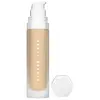What's inside
What's inside
 Key Ingredients
Key Ingredients

 Benefits
Benefits

 Concerns
Concerns

 Ingredients Side-by-side
Ingredients Side-by-side

Butane
Water
Skin ConditioningPropane
Hydrogenated Coconut Acid
EmollientCoco-Caprylate/Caprate
EmollientButylene Glycol
HumectantSilica
AbrasiveAlcohol Denat.
AntimicrobialAluminum Starch Octenylsuccinate
AbsorbentDimethicone
EmollientIsobutane
Cetyl PEG/PPG-10/1 Dimethicone
EmulsifyingPolyglyceryl-6 Polyricinoleate
EmulsifyingHydrogenated Polyisobutene
EmollientC15-19 Alkane
SolventSodium Chloride
MaskingPolyglyceryl-2 Isostearate
EmulsifyingDimethicone Crosspolymer
Emulsion StabilisingDisteardimonium Hectorite
StabilisingCaprylyl Glycol
EmollientHydrogenated Poly(C6-14 Olefin)
EmollientDisodium Stearoyl Glutamate
CleansingAluminum Hydroxide
EmollientParfum
MaskingTocopherol
AntioxidantLinalool
PerfumingPentaerythrityl Tetra-Di-T-Butyl Hydroxyhydrocinnamate
AntioxidantBHT
AntioxidantCI 19140
Cosmetic ColorantCI 42090
Cosmetic ColorantCI 77007
Cosmetic ColorantCI 77163
Cosmetic ColorantIron Oxides
CI 77891
Cosmetic ColorantButane, Water, Propane, Hydrogenated Coconut Acid, Coco-Caprylate/Caprate, Butylene Glycol, Silica, Alcohol Denat., Aluminum Starch Octenylsuccinate, Dimethicone, Isobutane, Cetyl PEG/PPG-10/1 Dimethicone, Polyglyceryl-6 Polyricinoleate, Hydrogenated Polyisobutene, C15-19 Alkane, Sodium Chloride, Polyglyceryl-2 Isostearate, Dimethicone Crosspolymer, Disteardimonium Hectorite, Caprylyl Glycol, Hydrogenated Poly(C6-14 Olefin), Disodium Stearoyl Glutamate, Aluminum Hydroxide, Parfum, Tocopherol, Linalool, Pentaerythrityl Tetra-Di-T-Butyl Hydroxyhydrocinnamate, BHT, CI 19140, CI 42090, CI 77007, CI 77163, Iron Oxides, CI 77891
Water
Skin ConditioningDimethicone
EmollientButylene Glycol Dicaprylate/Dicaprate
EmollientDiphenylsiloxy Phenyl Trimethicone
Skin ConditioningGlycerin
HumectantSynthetic Fluorphlogopite
Cetyl PEG/PPG-10/1 Dimethicone
EmulsifyingTrisiloxane
Skin ConditioningButylene Glycol
Humectant1,2-Hexanediol
Skin ConditioningTrimethylsiloxysilicate
EmollientDisteardimonium Hectorite
StabilisingPEG-10 Dimethicone
Skin ConditioningPolyphenylsilsesquioxane
Magnesium Sulfate
Dimethicone Crosspolymer
Emulsion StabilisingLauroyl Lysine
Skin ConditioningTriethoxycaprylylsilane
Aluminum Hydroxide
EmollientPolyhydroxystearic Acid
EmulsifyingEthylhexyl Palmitate
EmollientIsopropyl Myristate
EmollientIsostearic Acid
CleansingLecithin
EmollientTerminalia Ferdinandiana Fruit Extract
AntioxidantTrisodium Ethylenediamine Disuccinate
Polyglyceryl-3 Polyricinoleate
EmulsifyingCyperus Rotundus Root Extract
Skin ConditioningCI 77891
Cosmetic ColorantIron Oxides
Water, Dimethicone, Butylene Glycol Dicaprylate/Dicaprate, Diphenylsiloxy Phenyl Trimethicone, Glycerin, Synthetic Fluorphlogopite, Cetyl PEG/PPG-10/1 Dimethicone, Trisiloxane, Butylene Glycol, 1,2-Hexanediol, Trimethylsiloxysilicate, Disteardimonium Hectorite, PEG-10 Dimethicone, Polyphenylsilsesquioxane, Magnesium Sulfate, Dimethicone Crosspolymer, Lauroyl Lysine, Triethoxycaprylylsilane, Aluminum Hydroxide, Polyhydroxystearic Acid, Ethylhexyl Palmitate, Isopropyl Myristate, Isostearic Acid, Lecithin, Terminalia Ferdinandiana Fruit Extract, Trisodium Ethylenediamine Disuccinate, Polyglyceryl-3 Polyricinoleate, Cyperus Rotundus Root Extract, CI 77891, Iron Oxides
Ingredients Explained
These ingredients are found in both products.
Ingredients higher up in an ingredient list are typically present in a larger amount.
Aluminum Hydroxide is a form of aluminum. It can be naturally found in nature as the mineral gibbsite. In cosmetics, Aluminum Hydroxide is used as a colorant, pH adjuster, and absorbent.
As a colorant, Aluminum Hydroxide may add opacity, or reduce the transparency. Aluminum hydroxide is contains both basic and acidic properties.
According to manufacturers, this ingredient is an emollient and humectant. This means it helps hydrate the skin.
In medicine, this ingredient is used to help relieve heartburn and help heal ulcers.
There is currently no credible scientific evidence linking aluminum hydroxide in cosmetics to increased cancer risk.
Major health organizations allow the use of aluminum hydroxide in personal care products and have not flagged it as a carcinogenic risk at typical usage levels.
Learn more about Aluminum HydroxideButylene Glycol (or BG) is used within cosmetic products for a few different reasons:
Overall, Butylene Glycol is a safe and well-rounded ingredient that works well with other ingredients.
Though this ingredient works well with most skin types, some people with sensitive skin may experience a reaction such as allergic rashes, closed comedones, or itchiness.
Learn more about Butylene GlycolThis ingredient is a high molecular weight silicone. It has emulsifying and skin conditioning properties.
Ci 77891 is a white pigment from Titanium dioxide. It is naturally found in minerals such as rutile and ilmenite.
It's main function is to add a white color to cosmetics. It can also be mixed with other colors to create different shades.
Ci 77891 is commonly found in sunscreens due to its ability to block UV rays.
Learn more about CI 77891Dimethicone is a type of synthetic silicone created from natural materials such as quartz.
What it does:
Dimethicone comes in different viscosities:
Depending on the viscosity, dimethicone has different properties.
Ingredients lists don't always show which type is used, so we recommend reaching out to the brand if you have questions about the viscosity.
This ingredient is unlikely to cause irritation because it does not get absorbed into skin. However, people with silicone allergies should be careful about using this ingredient.
Note: Dimethicone may contribute to pilling. This is because it is not oil or water soluble, so pilling may occur when layered with products. When mixed with heavy oils in a formula, the outcome is also quite greasy.
Learn more about DimethiconeDimethicone Crosspolymer is a silicone created by modifying dimethicone with hydrocarbon side chains. Due to its large size, it does not penetrate skin. It is considered non-occlusive.
Dimethicone Crosspolymer is used to stabilize and thicken products. It also helps give products a silky feel.
Disteardimonium Hectorite comes from the clay mineral named hectorite. It is used to add thickness to a product.
It can also help stabilize a product by helping to disperse other ingredients.
Hectorite is a rare, white clay mineral.
Learn more about Disteardimonium HectoriteWater. It's the most common cosmetic ingredient of all. You'll usually see it at the top of ingredient lists, meaning that it makes up the largest part of the product.
So why is it so popular? Water most often acts as a solvent - this means that it helps dissolve other ingredients into the formulation.
You'll also recognize water as that liquid we all need to stay alive. If you see this, drink a glass of water. Stay hydrated!
Learn more about WaterThis ingredient is a combination of red, black, and yellow iron oxide pigments. This combination of colors is usually found in foundation, because it results in a "skin" color.